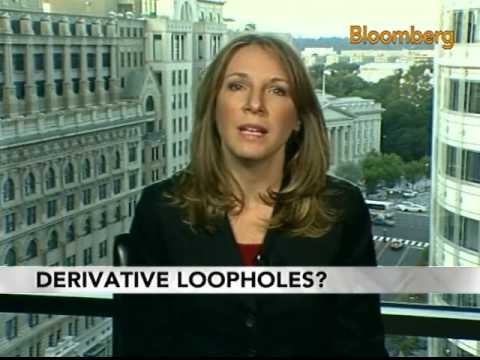Companies Exempt From Derivatives Rules May Yet Get Hit
Post on: 13 Май, 2015 No Comment

By Ben Protess December 29, 2010 5:44 pm December 29, 2010 5:44 pm
The new financial regulations coming out of Washington are packed with exemptions – perhaps none greater than the promise to excuse Shell Energy, United Airlines and thousands of other nonfinancial companies that use derivatives from complying with proposed rules for the shadowy $600 trillion market.
But some corporations and even some lawmakers now say the so-called end-user exemption — the provision in the Dodd-Frank financial overhaul law protecting nonfinancial companies from new regulations — could be a fallacy. Although one section of the 2,300-page law exempted the companies from some new rules, another provision could expose them to tough new margin requirements.
The end-user exemption has never been the Holy Grail that other people have thought it was, said Joel Telpner, a partner at the law firm Jones Day, which represents end users and banks that arrange derivative transactions.
The Dodd-Frank financial overhaul law, which President Obama signed in July, requires big banks and other financial institutions to process derivatives through regulated clearinghouses, which serve as a backstop in case one party defaults.
Under pressure from airlines, energy companies and others, lawmakers excused “commercial end users” from the clearing requirement so long as the companies used derivatives to mitigate risk in their business. Airlines, for instance, use derivatives to hedge against a rise in fuel costs. Manufacturing companies try to protect against fluctuations in interest rates.
The nonfinancial firms feared that the clearing process would force them to collectively post hundreds of billions of dollars in margin, or collateral, which could tie up precious corporate funds and damage their bottom line.
While Capitol Hill may have given end users a pass on using regulated clearinghouses, those companies may still have to post margin on the trades, effectively making the exemption moot.
“The exemption is fairly meaningless if regulators have the authority to impose margin,” said Sam Peterson, a senior adviser to Chatham Financial, a Pennsylvania-based consulting firm for end users. The firm is part of a coalition of interests that have been lobbying regulators, hoping Washington will show mercy on end users. “This is the No. 1 concern from our point of view.”
At least one regulator has shown some sympathy for that perspective.
Gary Gensler. chairman of the Commodity Futures Trading Commission. has said he opposes enforcing onerous margin requirements on end users.
But in an interview with DealBook, he said, “I’m only one commissioner.”
The confusion stems from an all-night legislative session in June. When bleary-eyed lawmakers put the finishing touches on Dodd-Frank, they left some provisions open to interpretation.
Even when derivative deals are not cleared, the financial overhaul law requires regulators to enforce margin requirements on banks and other financial companies that arrange the deals.
Yet lawmakers failed to clarify whether end users involved in those deals will have to post margin as well.
Five days after that marathon session, the author of the derivatives rules, Senator Blanche Lincoln of Arkansas, wrote a letter to fellow lawmakers clarifying her intentions.
“The legislation does not authorize the regulators to impose margin on end users, those exempt entities that use swaps to hedge or mitigate commercial risk,” she said in the letter, dated June 30. “If regulators raise the costs of end-user transactions, they may create more risk.”
Some Republicans agree.

In a Dec. 16 letter to several top regulators, Representative Spencer Bachus of Alabama, the incoming chairman of the House Financial Services Committee, said that imposing margin “requirements on companies that engage in the hedging of legitimate business risks would therefore defeat the purpose of the end-user exemption and contravene Congressional intent.”
These letters could carry some weight with regulators, but the agencies must ultimately enforce the letter of the law.
Meanwhile, end users and their lobbyists are flocking to Washington to make their case, agency records show.
Why all the concern? Companies argue that billions of dollars are at risk.
If new regulations required end users to post margin on each derivative trade, the firms would have to divert money away from new projects, research and development.
That money would “sit idle,” Mr. Peterson said. “With the economy scuttling, that would be a huge mistake.”
At a public meeting at the Securities and Exchange Commission this month, Robert Reilley of Shell Energy North America said new margin requirements were unnecessary because banks and other companies that brokered swap transactions “do a pretty good job” of scrutinizing the trades. Some companies said that they already posted margin whenever they executed a derivatives deal.
At the meeting, regulators also heard from those advocating stricter rules, including Randall Dodd, director of the Financial Policy Forum in Washington.
Mr. Dodd warned that without enhanced margin and capital requirements, swaps could pose a systemic risk to the economy. Although energy companies “didn’t cause a problem during the crisis,” Mr. Dodd said, “we don’t know where the next crisis is going to come from.”
The five-member Commodity Futures Trading Commission plans to propose margin requirements in January. The agency is aiming to complete the derivatives rules by July 2011.














